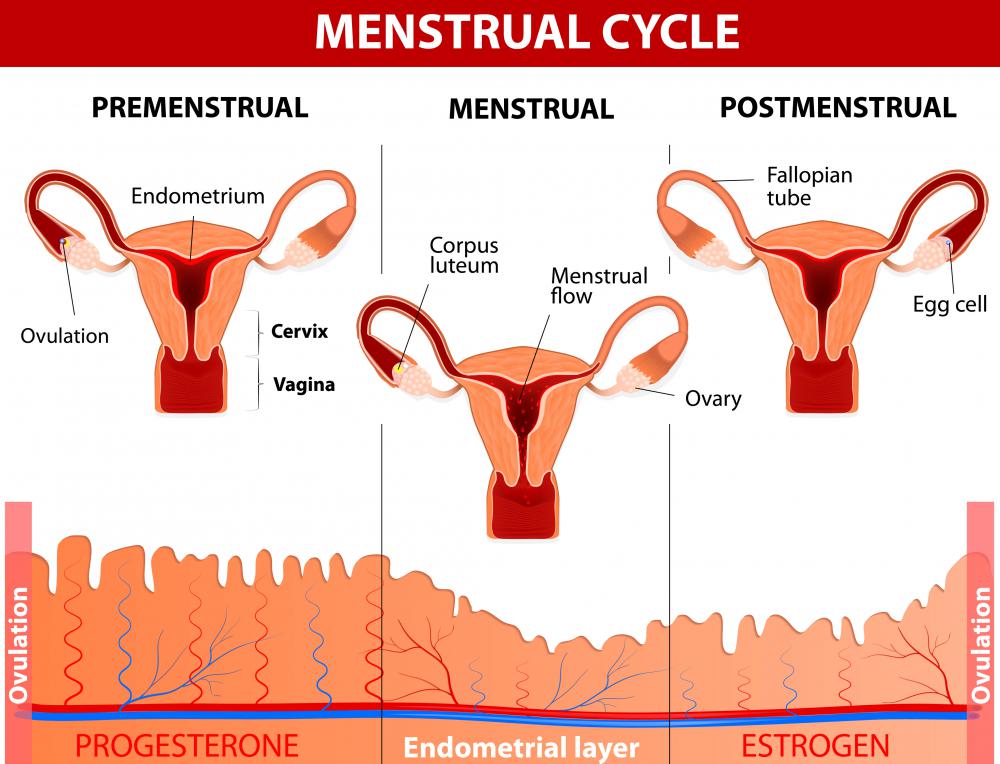At WiseGEEK, we're committed to delivering accurate, trustworthy information. Our expert-authored content is rigorously fact-checked and sourced from credible authorities. Discover how we uphold the highest standards in providing you with reliable knowledge.
What is Considered an Abnormal Menstruation Cycle?
The typical menstruation cycle lasts about 28 days, and the normal length of a period is five days. Of course, there is a range that is considered standard, but a menstrual cycle that strays from the average is typically referred to as abnormal. For example, a period that does not last anywhere from three to seven days is usually considered irregular, while an entire cycle that does not last between 20 and 35 days is also abnormal. Particularly heavy or light flow can also constitute an abnormal menstruation cycle, as it is not normal to need to change pads or tampons every hour or two. In addition, strong or sudden symptoms can signal an abnormal menstruation cycle, as these should stay about the same every month.
While five days is usually considered the norm when it comes to period length, the typical range is quite wide. In fact, a woman whose period lasts anywhere from three to seven days is within the normal range. For this reason, it is usually a good idea to contact a doctor if the period only lasts two days or less, as there could be a problem with the uterine lining or hormones involved in menstruation. On the other hand, it is also important to seek help if blood flow continues for longer than a week, as this could lead to anemia or other health issues. Similarly, a period that comes more frequently than every 20 days, or less often than every 35 days, usually indicates an abnormal menstruation cycle.

Blood flow should also be noted when determining whether a period is normal. For example, it is considered typical to have to change a pad or tampon about every four to eight hours. Of course, some women have one or two heavy flow days in their cycle that makes it necessary to change it slightly more often. If, however, it is frequently necessary to change the pad or tampon every one to two hours, the blood flow may be abnormally high.

Some women have particularly severe symptoms before their menstrual period appears. Not only does this usually cause discomfort, but it could also indicate an underlying problem. For example, endometriosis is a condition that results in an abnormal menstruation cycle that often includes fatigue, severe cramping, and pain with bleeding. Whether symptoms are hard to endure every month, or have become severe only recently, it is often good to talk to a doctor to determine the reason for the abnormal menstruation cycle. An abnormal menstrual cycle does not always mean that there is a serious problem, but it is best to make sure.
AS FEATURED ON:
AS FEATURED ON:

















Discussion Comments
I disagree that cycles that last longer or shorter than the average are always abnormal. Each women is different and experiences menstruation a little differently. A woman that has always had cycles lasting 40 days or a woman always having periods lasting three days may not have an abnormal menstruation cycle.
My doctor said that the reproductive system is like a motor and it runs a little differently in everyone. What's concerning is if a woman's cycle patterns change suddenly and abruptly. So if a woman with a 40 day cycle suddenly starts experiencing 28 day cycles, that's a problem. Or if a woman with three day periods suddenly starts getting seven day periods. Doctors need to be notified of such changes.
@bluedolphin-- Do you also have heavy periods with a lot of cramping and pain?
I think you should see a doctor to get to the bottom of this. You might be experiencing a hormonal imbalance or might have another health problem affecting your periods. For example, problems with the thyroid can also cause changes in periods.
Whatever it is, it's best to get to the bottom of it. Otherwise, you will continue to experience issues every month. Abnormal cycles also tend to worsen PMS symptoms. I know that when my period is late, my PMS symptoms are worse and last longer. It can be debilitating sometimes.
I guess I have an abnormal menstrual cycle because my cycle lasts about forty days. Every month, it seems like my period is late. But I've actually started marking my periods on a calendar and they occur every forty days.
Post your comments